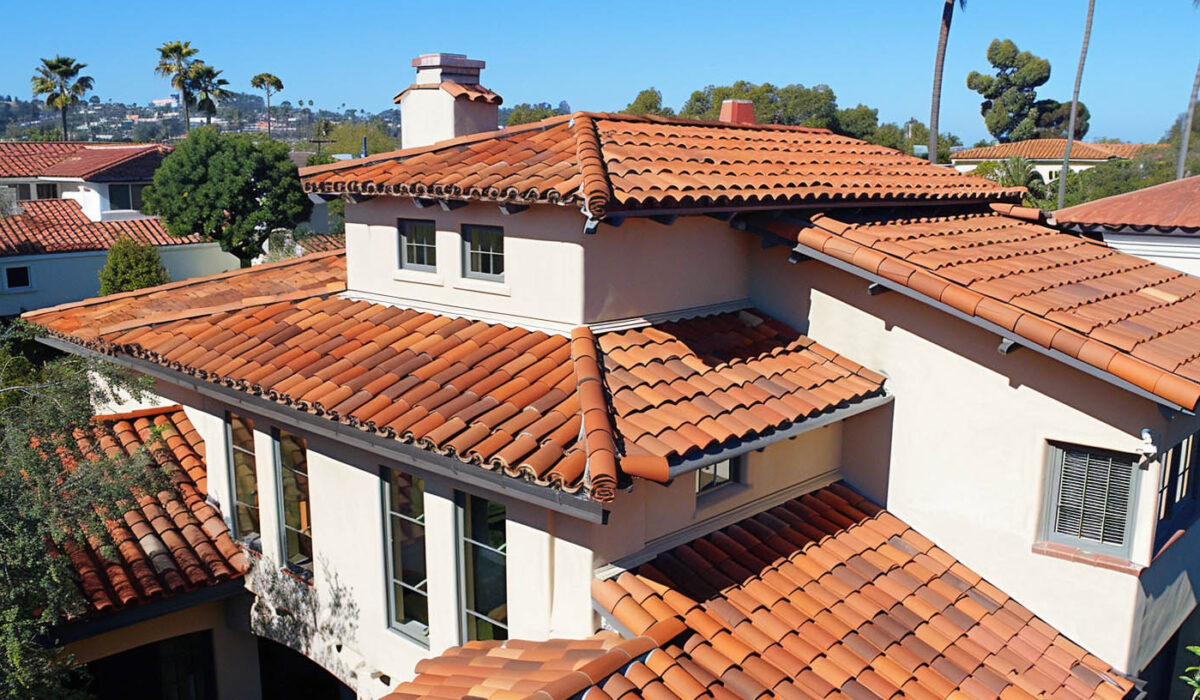Living in a vibrant city like San Diego, CA, means enjoying the energy, but it also comes with constant noise. If you’re looking for peace and quiet at home, your roof can make a huge difference. As GAF Master Elite and Owens Corning Preferred contractors, we at Tile Roofing San Diego know that tile roofing is an outstanding solution for reducing noise in urban environments, creating a more serene living space for you and your family.
Tile Roofs and Urban Noise Challenges in San Diego
Urban noise is more than just an annoyance; it can impact your quality of life. In a bustling city like San Diego, CA, the sounds of traffic, construction, and overhead planes are constant. Your choice of roofing materials plays a direct role in how much of that external noise makes its way into your home.
A well-chosen roof acts as a primary barrier against these disturbances. Below, we explore the specific sounds affecting San Diego and how the right roof can provide a solution.
Contact UsCommon Urban Noise Sources Affecting San Diego Homes
If you live in San Diego, CA, you are likely familiar with a variety of city noises that can disrupt your peace. This noise pollution can easily penetrate homes with less-effective roofing, increasing sound transmission from the outside.
Some of the most common sources of urban noise affecting San Diego homes include:
- Heavy street traffic and freeway sounds
- Aircraft from nearby airports
- Construction projects
- General neighborhood activity
Choosing a roofing material that effectively blocks these sounds is crucial. Installing a dense tile roof can significantly reduce the impact of this city noise, creating a quieter and more comfortable indoor environment for you.
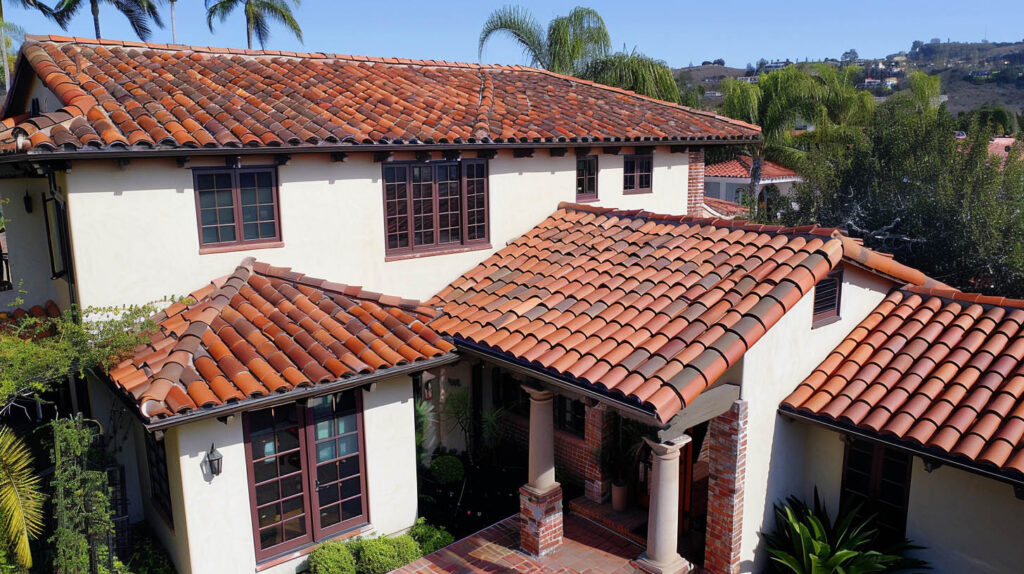
Why Roof Material Choice Matters for Sound Levels
Not all roofing materials are created equal when it comes to managing sound levels. The material’s density, mass, and structure determine its ability to provide soundproofing and noise reduction. For homeowners looking for effective sound insulation in busy parts of San Diego, tile roofs are highly recommended.
Lighter materials may vibrate or even amplify sound, while heavier, denser options absorb it. Key factors include:
- Mass and Density: Heavier materials block more sound.
- Layering: Multi-layered systems disrupt sound waves.
- Shape: Certain shapes can deflect sound.
These properties not only contribute to a quieter home but can also help regulate indoor temperatures, adding another layer of comfort and efficiency.
KeyTerms: tile roof, urban noise, San Diego
For those dealing with urban noise in San Diego, a tile roof is a smart and practical solution. These roofs are specifically designed to combat the high noise levels found in city environments, providing a shield against constant disruptions. When considering a tile roof for noise control, you should think about its density and the overall roofing system.
A complete roofing system, including quality underlayment, enhances the sound-blocking capabilities of the tiles. This combination creates a formidable barrier that dampens vibrations and absorbs sound energy.
By investing in a tile roof, San Diego homeowners can reclaim their peace and quiet. It’s a strategic upgrade that directly improves your home’s acoustic comfort and overall quality of life.
How Tile Roofing Reduces Noise
Tile roofing achieves significant noise reduction primarily through its mass and density. Materials like clay and concrete are naturally heavy, which helps to absorb and block sound energy before it can travel into your home. This inherent property makes tile an excellent choice for San Diego homes in noisy areas.
The way tiles are installed also contributes to a quieter home. The structure creates air pockets and layers that further disrupt sound waves. Let’s look closer at how these features work together.
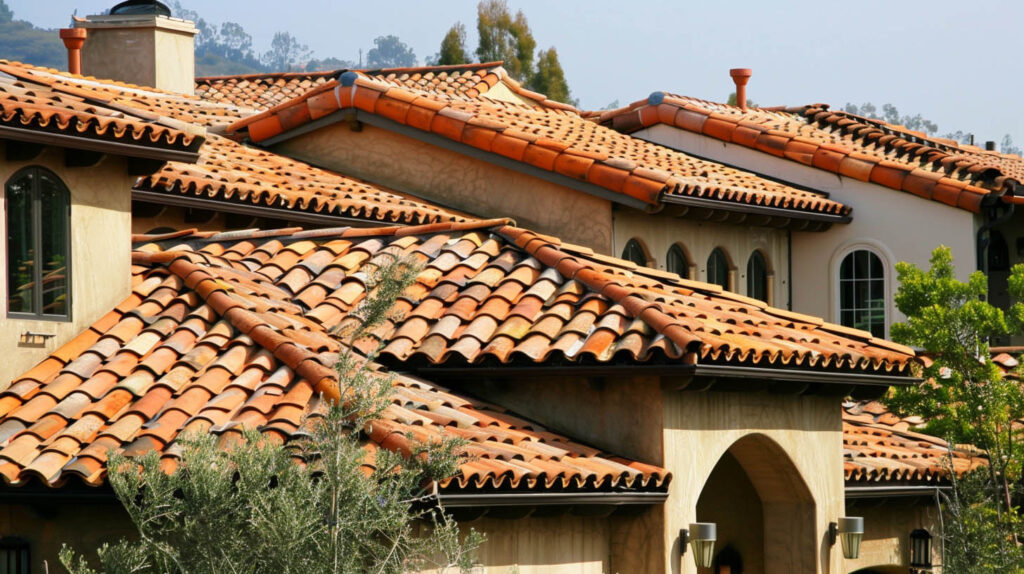
The Sound Insulation Properties of Tile Roofs
The primary advantage of tile roofing for soundproofing is its excellent sound insulation. Made from dense materials like clay or concrete, tiles have a high mass that is difficult for sound waves to penetrate. When external noise hits your roof, the tiles absorb a significant portion of the vibration.
This process provides effective noise reduction from sounds like heavy rain, hail, and city traffic. For San Diego homeowners, this means a much quieter interior space, free from the constant disturbances of urban life.
Unlike lighter materials that can vibrate and transfer sound, tile roofing acts as a solid barrier. This makes it one of the best choices available for creating a peaceful and serene home environment.
Tile Roof Structure and Its Impact on Noise Control
The structure of a tile roof itself plays a key role in noise control. Many tile profiles, such as the classic S-shape of Spanish tiles, create an air gap between the tile and the roof deck. This pocket of air serves as an additional layer of insulation, disrupting sound transmission before it reaches your attic.
This layered effect is a core part of the roofing system’s performance. The combination of the dense tile, the air gap, and the underlayment works together to dampen sound effectively.
Certain styles, like Spanish and concrete tiles, are particularly effective in San Diego’s urban setting due to their shape and mass. This makes them an excellent choice for homeowners prioritizing both architectural style and a quiet home.
KeyTerms: noise reduction, soundproofing, tile roof
When your goal is noise reduction and soundproofing, a tile roof is a fantastic starting point. The effectiveness comes from the inherent properties of the quality materials used, which are designed to block and absorb sound waves. However, you can enhance these benefits even further for maximum performance.
To maximize noise reduction, a tile roof can be combined with high-quality underlayment and insulation in the attic. These additional layers work with the tiles to create an even more robust barrier against external sounds.
This comprehensive approach ensures your San Diego home achieves the highest level of acoustic comfort. By layering these features, you create a complete soundproofing system that delivers peace and quiet.
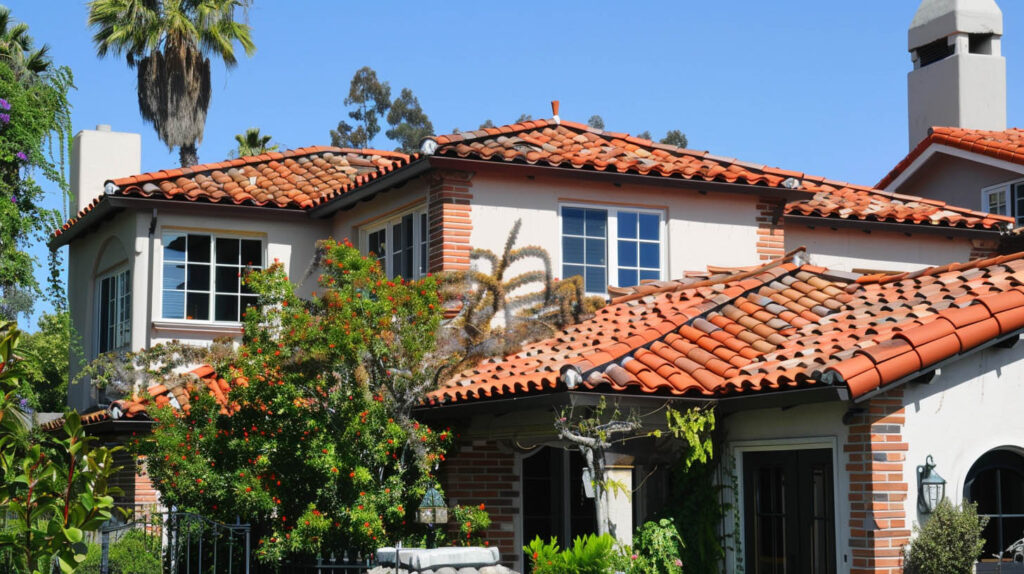
Tile Roofing vs. Other Materials for Noise Reduction
When comparing roofing materials for your San Diego home, it’s clear that tile roofing performs better for noise reduction than common alternatives like asphalt or metal. While all roofs provide some level of protection, tile’s density and structure give it a distinct advantage in blocking sound.
This superior performance, combined with its benefits in energy efficiency, makes tile a leading choice for homeowners in noisy urban settings. Let’s compare it directly to other popular options.
Comparison with Asphalt Shingle Roofs
Distinct differences arise when comparing tile roofing and traditional asphalt shingles regarding noise reduction. Tile roofs offer superior sound insulation properties, effectively dampening external noise, while asphalt shingles may allow for more sound transmission. The durability of tile roofs also means they withstand harsh weather conditions better, reducing the need for frequent roof replacement and enhancing acoustic comfort. For San Diego homeowners seeking a worthwhile investment in noise reduction and improved property value, tile roofs provide a compelling alternative to asphalt shingles.
Comparison with Metal Roofs
Metal roofs are known for their durability, but they present a significant challenge for noise control. Without proper and often expensive insulation, metal can amplify the sound of rain, hail, and other impacts, creating a noisy indoor environment. This high rate of sound transmission makes them less ideal for quiet homes.
In contrast, tile roofing is naturally quiet. Its density absorbs impact and dampens sound, providing a peaceful atmosphere even during harsh weather conditions.
For noise control in San Diego, tile roofing is the clear winner over metal. It offers a quiet and serene living space without the need for additional sound-dampening measures, making it a more straightforward and effective solution.
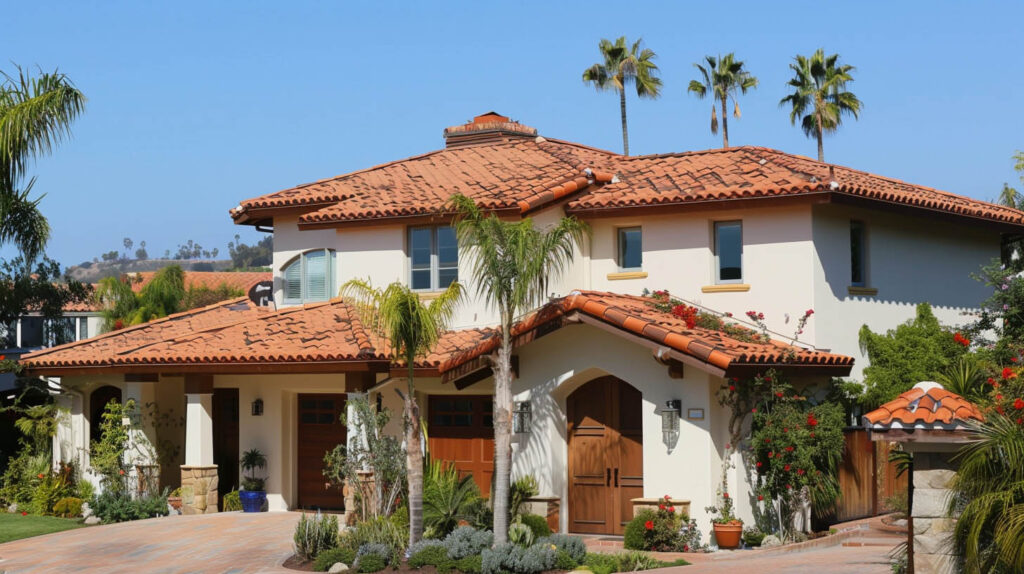
KeyTerms: tile roofing vs asphalt, tile roofing vs metal, San Diego
When comparing tile roofing vs. asphalt or tile roofing vs. metal, the choice for soundproofing in San Diego becomes clear. While asphalt shingles are cost-effective and metal roofs are durable, neither can match the natural sound-blocking capabilities of tile. The main advantage is its sheer density.
For San Diego homeowners who value a quiet home, the superior noise reduction offered by tile makes it a worthwhile investment. It effectively shields your home from the sounds of city life in a way other materials cannot.
Ultimately, if your priority is creating a peaceful retreat from urban noise, tile roofing stands out as the premium choice for its unmatched soundproofing benefits.
Call Us 619-350-1086Get in Touch
In conclusion, tile roofs offer significant noise reduction benefits for homeowners in urban San Diego, CA. With their superior sound insulation properties and unique structural design, they effectively mitigate the urban noise challenges that many residents face. By choosing tile roofing over other materials such as asphalt or metal, you not only enhance your home’s acoustics but also invest in a durable and aesthetically pleasing option. We at Tile Roofing San Diego pride ourselves on delivering quality and reliability. Don’t let urban noise disrupt your peace—get quotes for your commercial project today to explore how our tile roofing solutions can benefit you.
Frequently Asked Questions
Do roof tiles expand noise?
No, roof tiles do not expand or amplify noise. Their dense material is excellent at absorbing sound energy, which leads to significant noise reduction. A tile roofing system is one of the best choices for soundproofing your home against external disturbances.
How long are tile roofs good for in California?
In California, a professionally installed tile roof made from quality materials can last for 50 to 100 years or more. This exceptional lifespan makes tile roofing a durable and cost-effective choice for San Diego homeowners seeking a long-term solution.
Read our blog: Tile Roofing Myths San Diego Homeowners Should Stop Believing

